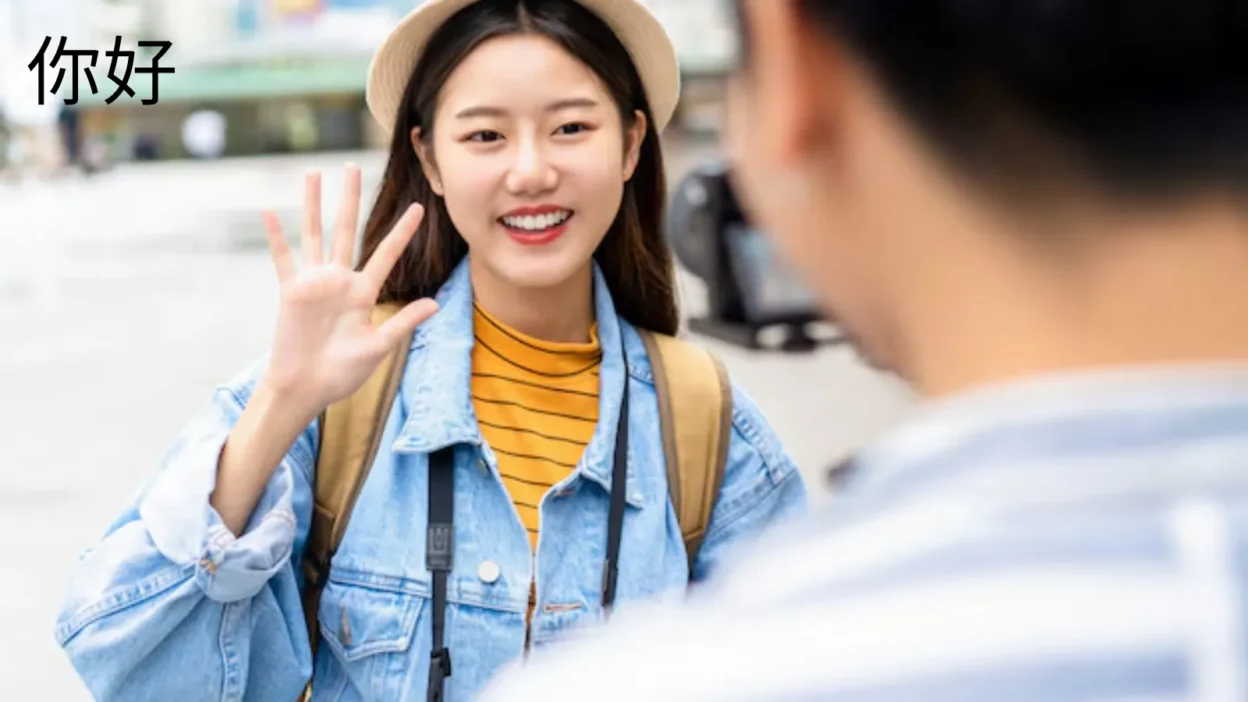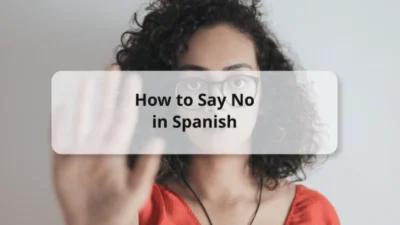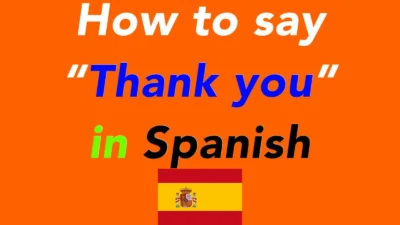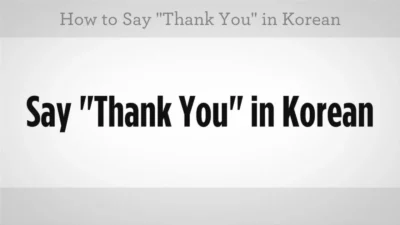How to Say Hi in Chinese is one of the first things beginners want to learn when starting the language. If you’re traveling, meeting Chinese speakers, or just exploring a new culture, knowing the right greeting is a great way to make a good first impression. Mandarin Chinese offers several ways to say hi depending on formality, region, and context.
In this guide, you’ll discover how to say hi in Chinese with the most common and useful greetings for everyday conversations.
Learning how to say hi in Chinese also helps you start conversations respectfully and build meaningful connections. A simple hi in the local language can go a long way in showing interest and appreciation for the culture.
Say Hi in Chinese Origin & Examples
Discover 15 ways to say hi in Chinese with origin, meaning, and real-life examples to sound natural and respectful.
Remember, knowing how to say hi in Chinese is a small but powerful step toward deeper connections and smoother communication.
It’s also a great way to show appreciation for Chinese language and culture right from the first word.
1. 你好 (Nǐ hǎo) — Hello
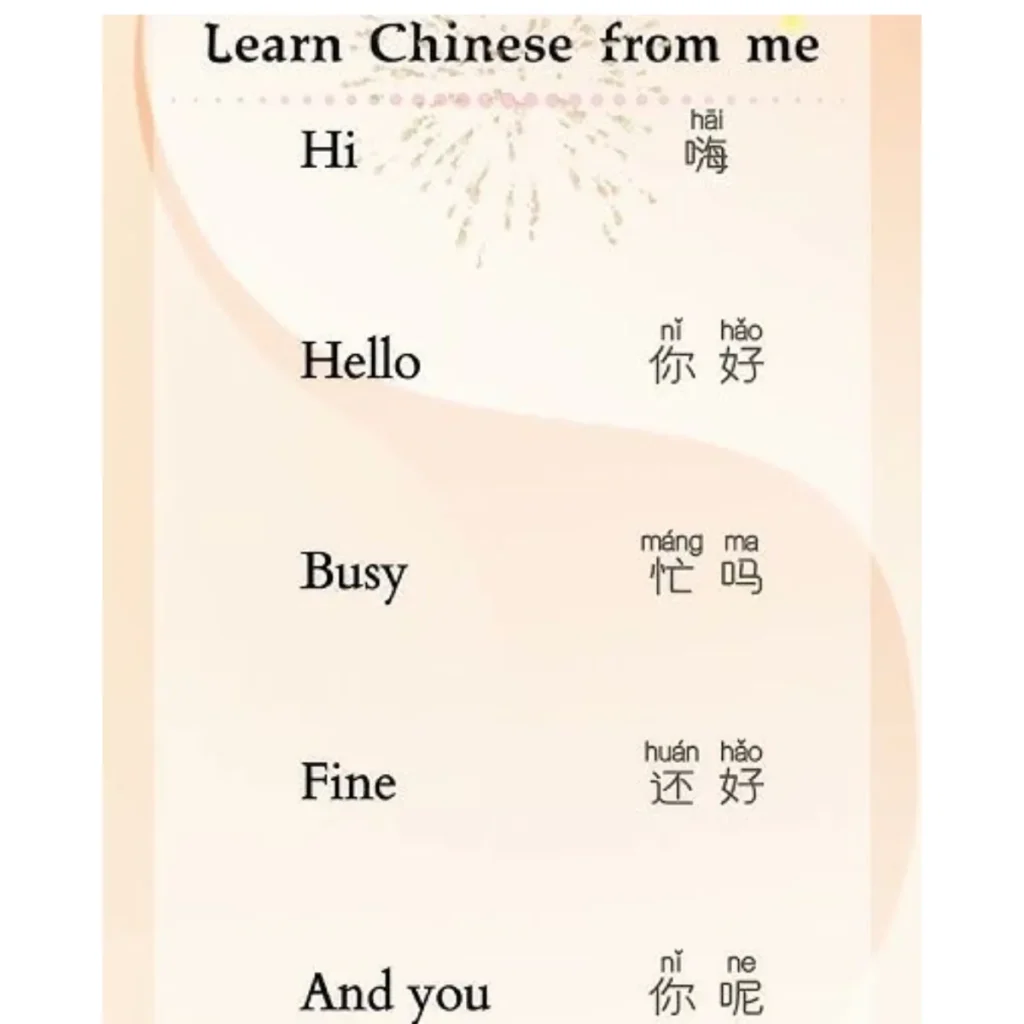
Origin:
Literally means “you good.” It’s the most standard way to say hi in Mandarin Chinese.
Example:
👤 User A: 你好,我叫李华。 (Hello, my name is Li Hua.)
👤 User B: 你好,很高兴认识你。 (Hello, nice to meet you.)
Use: Neutral and widely accepted; works in most situations.
2. 嗨 (Hāi) — Hi
Origin:
A transliteration of the English word “hi,” commonly used by younger Chinese speakers or in casual texts and chats.
Example:
👤 User A: 嗨,你在干嘛? (Hi, what are you doing?)
👤 User B: 在看剧呢! (Watching a drama!)
Use: Very informal; often used in online or spoken casual contexts.
3. 您好 (Nín hǎo) — Hello (polite form)
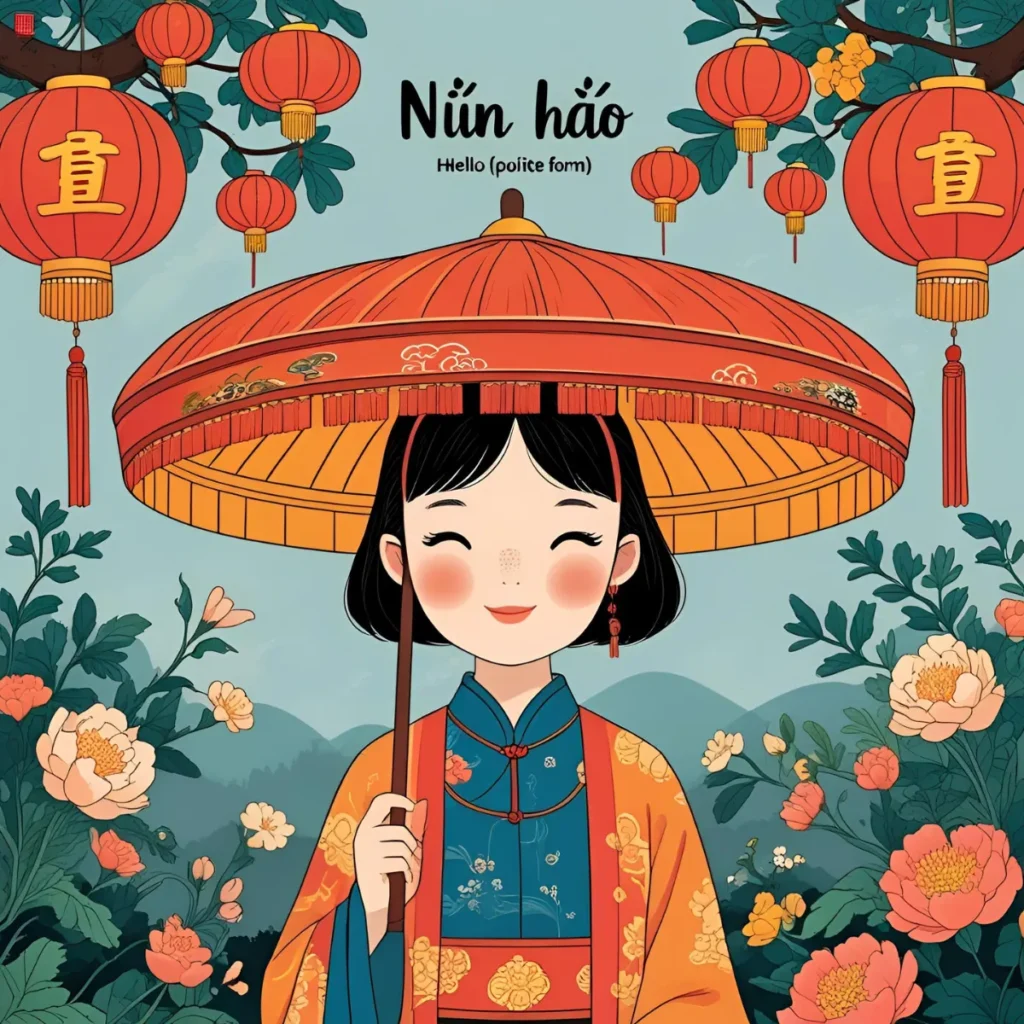
Origin:
“您” is the respectful form of “你” (you), used to show politeness to elders or authority figures.
Example:
👤 User A: 您好,王老师。 (Hello, Teacher Wang.)
👤 User B: 你好,同学。 (Hello, student.)
Use: Formal; use with elders, teachers, bosses, etc.
4. 早上好 (Zǎoshang hǎo) — Good morning
Origin:
Standard time-based greeting that’s common in daily life.
Example:
👤 User A: 早上好!你今天看起来很精神! (Good morning! You look energetic today!)
👤 User B: 谢谢,你也是! (Thanks, you too!)
Use: Polite, warm, used in both formal and informal contexts.
5. 早 (Zǎo) — Morning!
Origin:
A shortened, casual form of “早上好,” much like saying “Morning!” in English.
Example:
👤 User A: 早!今天下雨了。 (Morning! It’s raining today.)
👤 User B: 是啊,记得带伞。 (Yeah, don’t forget your umbrella.)
Use: Casual and quick; great for friends or coworkers.
6. 喂 (Wéi) — Hello? (Phone)
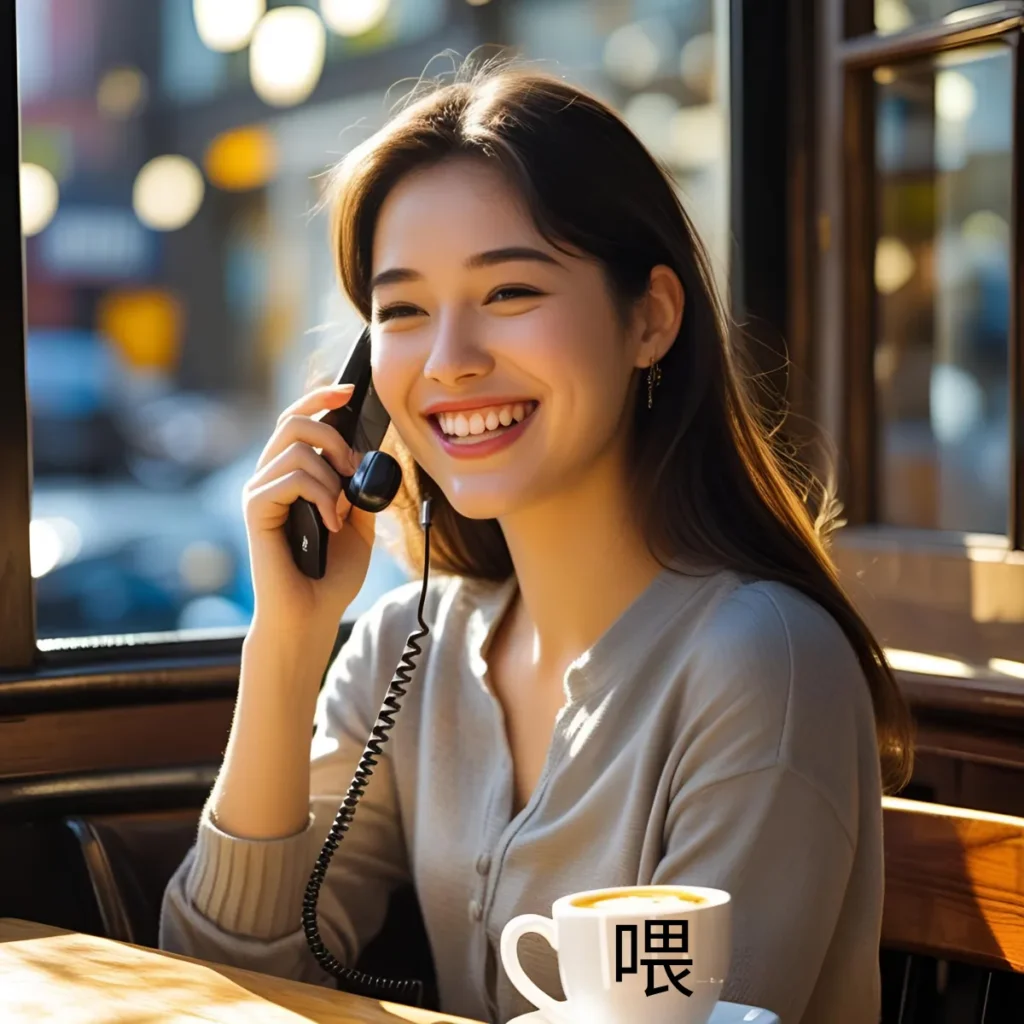
Origin:
Used exclusively when answering the phone. Pronounced with a rising tone.
Example:
👤 User A: 喂? (Hello?)
👤 User B: 喂,是小张吗? (Hello, is this Xiao Zhang?)
Use: On the phone only.
7. 嘿 (Hēi) — Hey
Origin:
Borrowed from English and adapted into Chinese informal speech.
Example:
👤 User A: 嘿,你也来了? (Hey, you came too?)
👤 User B: 是啊,一起看电影吧。 (Yeah, let’s watch the movie together.)
Use: Informal and youthful.
8. 哈喽 (Hālóu) — Hello (transliteration)
Origin:
Directly adapted from the English “hello,” often used in social media, messages, and informal speech.
Example:
👤 User A: 哈喽~你到家了吗? (Hello~ Did you get home?)
👤 User B: 到啦,谢谢你! (I did, thanks!)
Use: Playful and trendy; common online or in casual conversation.
9. 大家好 (Dàjiā hǎo) — Hello, everyone
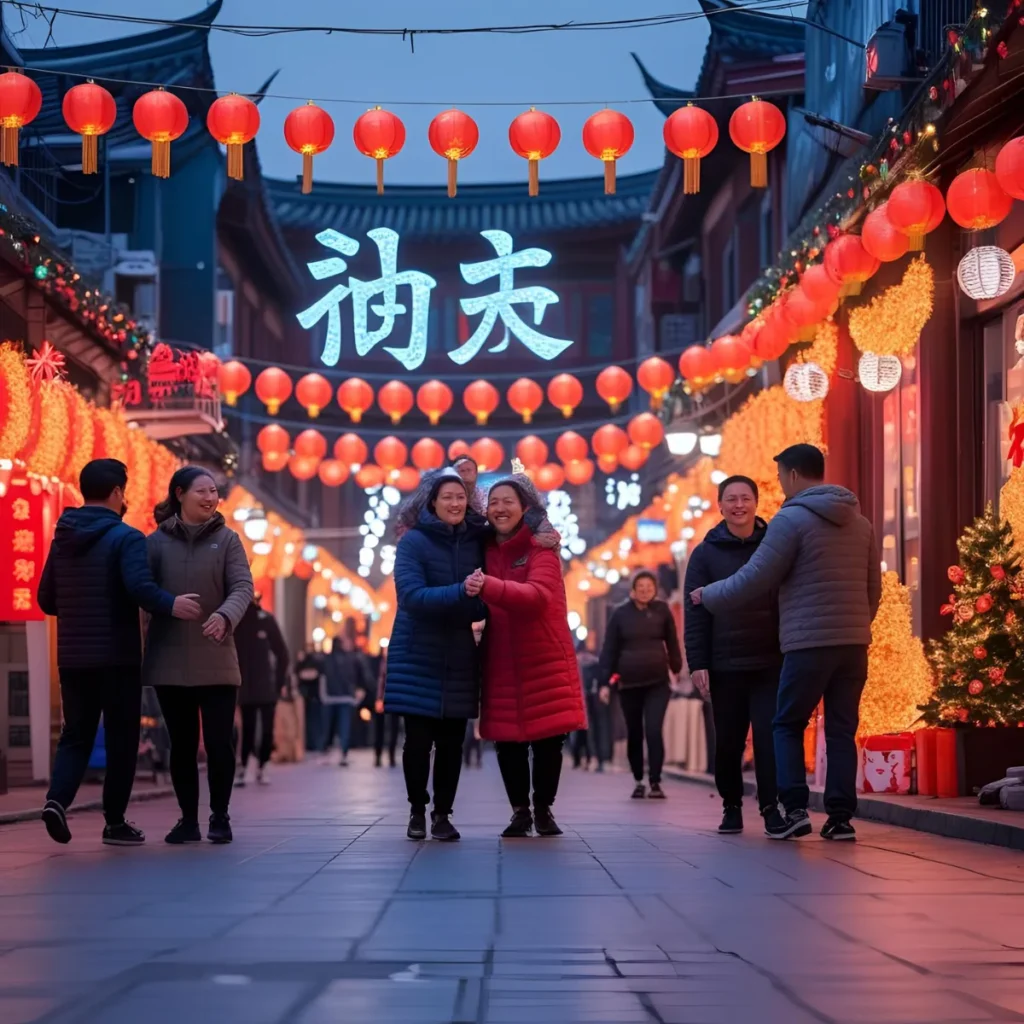
Origin:
Common group greeting in formal or public speaking settings.
Example:
👤 User A: 大家好,我是今天的主持人。 (Hello everyone, I’m today’s host.)
👤 User B: 欢迎你! (Welcome!)
Use: Formal; good for presentations, meetings, or videos.
10. 你吃了吗?(Nǐ chī le ma?) — Have you eaten?
Origin:
Traditional Chinese greeting, especially in older generations. It was a way of showing care during hard times.
Example:
👤 User A: 你吃了吗? (Have you eaten?)
👤 User B: 吃了,谢谢关心! (Yes, thanks for asking!)
Use: Polite, old-fashioned; less common with young people today.
11. 最近好吗?(Zuìjìn hǎo ma?) — How have you been?
Origin:
Used to check in with someone after a while apart.
Example:
👤 User A: 最近好吗?好久不见! (How have you been? Long time no see!)
👤 User B: 挺好的,你呢? (Pretty good, you?)
Use: Friendly; shows genuine interest.
12. 哟 (Yō) — Yo / Hey there
Origin:
An exclamation used to greet someone with surprise or enthusiasm.
Example:
👤 User A: 哟,你怎么也来了? (Yo, you came too?)
👤 User B: 哈哈,当然了! (Haha, of course!)
Use: Very informal and fun.
13. 久违了 (Jiǔwéi le) — Long time no see
Origin:
Traditional greeting used when you haven’t seen someone in a while.
Example:
👤 User A: 久违了,你还好吗? (Long time no see. Are you doing well?)
👤 User B: 还不错!你呢? (Not bad! You?)
Use: Warm and respectful; not overly formal.
14. 老师好 / 同学好 (Lǎoshī hǎo / Tóngxué hǎo) — Hello, teacher / Hello, classmate
Origin:
Standard greetings used in schools across China.
Example:
👤 User A (class): 老师好! (Hello, teacher!)
👤 User B (teacher): 同学们好! (Hello, students!)
Use: Very common in educational settings.
15. 在吗?(Zài ma?) — Are you there?
Origin:
Casual online/text greeting, like saying “Hey, you around?”
Example:
👤 User A: 在吗?想问你个事儿。 (You there? I want to ask something.)
👤 User B: 在的,说吧。 (I’m here, go ahead.)
Use: Casual, usually used in messages or texts.
FAQs
1. What is the simplest way to say “Hi” in Chinese?
The easiest way is “嗨” (hāi) — the direct Chinese version of “hi.”
2. What is the most common everyday greeting?
People usually say “你好” (nǐ hǎo) — meaning “hello.”
3. Is there a cute or friendly way to say hi?
Yes — “哈喽” (hālóu) is a cute, playful version used online and by young people.
4. How do you say hi politely?
Use “您好” (nín hǎo) when speaking respectfully to elders or strangers.
5. How do you say hi on the phone?
Answer with “喂” (wéi) — the standard phone greeting.
6. How do you say hi to a group?
Use “大家好” (dàjiā hǎo) — “Hi everyone!”
7. Is “hi” the same in Mandarin and Cantonese?
Both understand 嗨 (hāi), but Cantonese speakers also use “你好” (néih hóu).
8. How do friends greet casually?
Friends often say “嘿” (hēi) — like “hey!”
9. How do kids say hi in Chinese?
Kids usually say “嗨!” — short, fun, and easy.
10. Can “ni hao” be used as hi?
Yes — “你好” (nǐ hǎo) works for “hi,” “hello,” and “hey.”
11. What’s a formal greeting for meetings?
Use “各位好” (gèwèi hǎo) — polite and professional.
12. Is there slang for hi in Chinese?
Yes, some people use “嗨呀” (hāi ya) online for a relaxed tone.
13. How do you say “Hi, how are you?”
Say “你好,你好吗?” (nǐ hǎo, nǐ hǎo ma?).
14. How do you greet someone after a long time?
Use “好久不见” (hǎo jiǔ bú jiàn) — “Long time no see.”
15. What greeting works in any Chinese-speaking region?
“你好” and “嗨” are understood everywhere.
Conclusion:
Now that you’ve learned how to say hi in Chinese, you’re ready to greet people with confidence and cultural respect. If you’re saying “你好 (nǐ hǎo)” in a formal setting or using casual greetings with friends, these phrases will help you start conversations the right way.
Keep practicing these greetings to make your Mandarin sound more natural and friendly.
